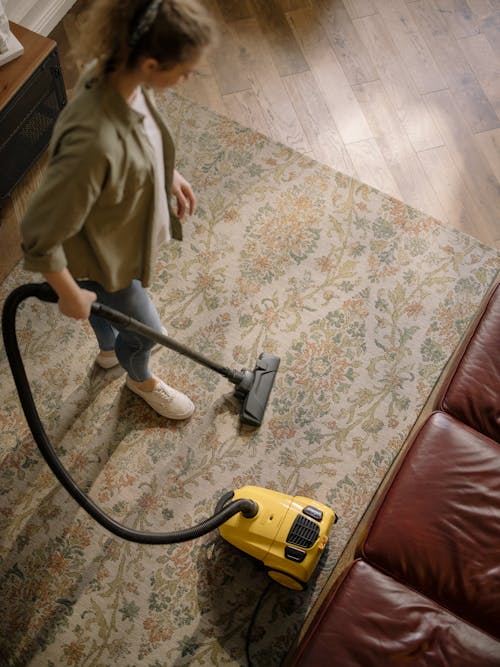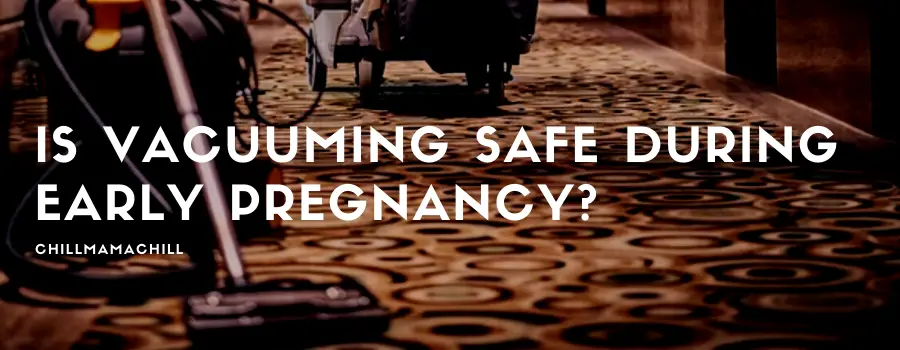Wouldn’t it be convenient if all household chores wait until your baby is born? But housework still demands doing, or else your home won’t be a suitable place to welcome a newborn. Since your house needs cleaning, is vacuuming safe during early pregnancy?
Activities that require bending, such as using a mop or vacuum cleaner, can disturb your sciatica nerve. It runs down your lower back and legs, easily aggravated due to your hormonal, weight, and pressure changes in your body. Such injuries, including back pain, can cause complications in early pregnancy, leading to birth defects or miscarriage.
If you’ve got no helper, or the house isn’t that dusty, there are ways to approach vacuuming during early pregnancy. Use a vacuum cleaner with a more extended handle to minimize bending and take breaks as constantly as you feel tired. With a bit of care and caution, here are tips on safe house cleaning when pregnant.
What Are the Symptoms That Accompany Early Pregnancy?
It could be your first sign that you’re pregnant was a missed period, followed by an irrefutable pregnancy test. You probably started feeling bloated and peeing more than usual. Or tender breasts, nausea, and mood swings alerted you. While not everyone finds out this way, you’ll have at least noticed one of them.
Divided into three trimesters, the beginning of your pregnancy starts on the first day of your last menstrual period. That means full-term will be after 40 weeks or around ten months. The first trimester is marked by possible morning sickness and exhaustion, plus you’ll gain between two and four pounds. Most weight comes from the growing uterus, the placenta that feeds your baby, extra blood, and heavier breasts.
During early pregnancy, breathing and heart rates are fast. Your bladder is under a lot of pressure from the growing uterus, and you’ll be urinating a lot. There’ll also be emotional rollercoasters to deal with, and hormonal changes may be causing you nausea and vomiting. Despite these demands on your body, mild exercise is encouraged, and going about your day as typically as possible.
While physical activity can harm your pregnancy, its intensity has to align with extreme workouts or running a marathon. Housework, such as vacuuming in the first three months, won’t cause body temperatures to rise or deplete energy stores. Talk to your prenatal physician if any of these symptoms become unmanageable or seek help if you’re unable to do household chores.
How Can I Safely Vacuum During the First Trimester?
There’s no denying that you need to take special care of yourself during early pregnancy for the health and viability of the growing fetus. As your baby bump develops, you’ll begin to notice that certain positions and postures become problematic. Prolonged bending and lifting heavy things can start to get tricky, especially if you’re not using your body’s mechanical advantage.
Every pregnancy is different, just as each woman is. Bending down during the first trimester can be challenging for one mom-to-be, while another will do it with ease. You may start to experience extreme back or pelvic pain, especially towards the end of three months, as your belly grows more prominent.
It may not strictly apply to you or the early stages of your pregnancy, but you’ll be approaching tasks that require bending with care throughout the 40 weeks. You’ll also need to ensure you aren’t breathing dust, so ample ventilation or the use of a breathing mask is necessary.
To safely vacuum your house during early pregnancy, keep a straight back, and bend down by flexing your knees instead of your hip. That lessens any pressure on your lower back muscles, which can hurt when you try to stand back up. Use the cleaner’s handle or some other piece of furniture to support your frame, taking weight off your muscles and joints.
When using your knees to bend, keep your legs closer together, eliminating strain to your pubic symphysis or font pelvic joint. Take multiple breaks in your vacuuming if you feel winded out or exhausted, asking for help where necessary.
Can My Doctor Discourage Vacuuming as Unsafe During Early Pregnancy?
The American Pregnancy Association discourages any high-impact activity that could result in injury during any of the trimesters. Vacuuming is deemed safe as it’s done in the temperature-controlled and well-ventilated confines of your home. There’s little chance you’ll hurt yourself if you take due precautions, especially with bending and over-exerting your body.
When tackling extensive vacuuming projects, divide them into manageable chunks. You may be tempted to move heavy objects like furniture out of the way for easier housecleaning. That can strain your spine or sciatica nerve, which runs from your lower back down to your legs. Ensure the area you are working in is well ventilated. You could keep your body temperature down with air conditioning.

Your physician will not deter you from topical vacuuming unless yours is a high-risk pregnancy. That means you might have a history of miscarriages, preterm labor, ruptured membranes, or hypertension. You could be delegated to modified bed rest during the first three months to eliminate any danger to your developing fetus.
If you’re enduring a high-risk pregnancy, follow your obstetrician gynecologist’s recommendations whenever you engage in any physical activities. It would be best if you abandoned instances of vacuuming where you experience pain or discomfort immediately. Report signs like spotting, cramping, lightheadedness, sudden fatigue, or nausea. Blurred vision, vaginal discharge or leakage, and changes in body temperature could point to a severe problem.
Conclusion
So, now you know that vacuuming during early pregnancy is safe, except if yours is high risk. With a bit of caution, you can make this easy task more manageable by using a vacuum cleaner designed with a longer handle and no need for bending. Always wear protective gear, such as a breathing mask or gloves due to dust or other cleaning chemicals. That’s expressly important if you have a pet cat whose scat can carry toxoplasmosis, especially when dry poop goes airborne.

I’m Cathrine and I’m a 39-year-old mother of 3 from Utica, New York. And I’m extremely happy you’ve come to visit my hide-out on the web. Here I post about everything related to family-life and usually it will involve babies and lessons I’ve learned over the years from experts, friends, and my own mistakes. So hopefully you will find what i write fun and informational!

